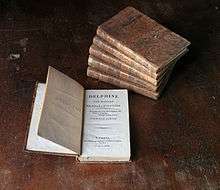Delphine (novel)
|
1803 edition | |
| Author | Anne Louise Germaine de Staël |
|---|---|
| Country | France |
| Language | French |
| Genre | epistolary novel |
Publication date | 1802 |
Delphine is the first novel by Anne Louise Germaine de Staël, published in 1802. The book is written in epistolary form (as a series of letters) and examines the limits of women's freedom in an aristocratic society. Although Madame de Staël denied political intent, the book was controversial enough for Napoleon to exile the author.
A new English translation was released by Avriel H. Goldberger in 1995.
Creation
In a literary and political essay called De la littérature dans ses rapports avec les institutions sociales published in 1800, Germaine de Staël writes about the history of literature and its links with political contexts, and also advocates the ideas of the Age of Enlightenment, which doesn't please Napoleon. The emperor of the French is also afraid of Madame de Staël's political relations, and suspects her to be an opponent. Delphine's publication in 1802 makes things even worse : Madame de Staël is exiled from Paris, and forbidden to get closer than 40 lieues from the city.
When publishing Delphine, she claims she is not interested in politics any more. Yet, this novel dedicated to "the silent France" (la France silencieuse in French) explicitly talks about subjects like women's status, but also poitical and sociological subjects like Protestantism, political liberalism or emigration.
Summary
The story tales place in Paris between 1789 and 1792. Delphine d'Albémar, a young widow, arranges a wedding between one of her distant relatives, Matilde de Vernon, and Léonce de Mondoville. But she falls in love with Léonce, and as he is engaged with Matilde, their love is impossible. The story ends tragically with Delphine killing herself.
Main characters
- Delphine d'Albémar, the heroine, who gives her name to the novel. Formerly married to M. d'Albémar, she is now a widow ; she is rich, generous and smart and wishes to make her friends happy. This is why she arranges the wedding of Matilde de Vernon and Léonce de Mondoville. She claims that the duty to do what is right is more important to her than the judgement of others on her doings, but when she falls in love with Léonce, she gets torn between the two, and ends up killing herself.
- Matilde de Vernon, a distant cousin and friend of Delphine. She is quite the opposite of Delphine, being discreet, bigot, but deeply in love with Léonce though she doesn't show it at first.
- Madame de Vernon, Matilde's mother, a pleasant-looking woman, but who is actually sly and acts for her own interest only. However, her character can be explained by her loveless marriage with M. de Vernon.
